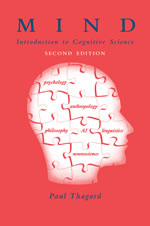|

Review
"This little gem of a book has three major virtues. First, it is easy to read and easy to understand. Second,
it clearly states the central thesis of cognitive science and precisely lays out the explanatory patterns underlying various
theories of cognition. Third, the book is unique in its presentation of the material, arranging it along various types of
knowledge representations such as rules, concepts, and images."
--Ashok Goel, College of Computing, Georgia Institute of
Technology
"The second edition of Mind represents a significant advance for an already excellent book. My enthusiasm
for continuing to use Thagard's accessible and consistently informative volume for Berkeley's large Introduction to Cognitive
Science course has been fully refreshed, as the updates in the new edition have made it a superb text for undergraduates."
--Michael
Ranney, Graduate School of Education, Department of Psychology, and the Institute for Cognitive and Brain Sciences, University
of California, Berkeley
Book Description
Cognitive science approaches the study of mind and intelligence
from an interdisciplinary perspective, working at the intersection of philosophy, psychology, artificial intelligence, neuroscience,
linguistics, and anthropology. With Mind, Paul Thagard offers an introduction to this interdisciplinary field for readers
who come to the subject with very different backgrounds. It is suitable for classroom use by students with interests ranging
from computer science and engineering to psychology and philosophy.
Thagard's systematic descriptions and evaluations
of the main theories of mental representation advanced by cognitive scientists allow students to see that there are many complementary
approaches to the investigation of mind. The fundamental theoretical perspectives he describes include logic, rules, concepts,
analogies, images, and connections (artificial neural networks). The discussion of these theories provides an integrated view
of the different achievements of the various fields of cognitive science.
This second edition includes substantial
revision and new material. Part I, which presents the different theoretical approaches, has been updated in light of recent
work the field. Part II, which treats extensions to cognitive science, has been thoroughly revised, with new chapters added
on brains, emotions, and consciousness. Other additions include a list of relevant Web sites at the end of each chapter and
a glossary at the end of the book. As in the first edition, each chapter concludes with a summary and suggestions for further
reading.
|
|
preface Cognitive science is the interdisciplinary study of mind
and intelligence, embracing philosophy, psychology, artificial intelligence, neuroscience, linguistics, and anthropology.
p.3 Have you ever wondered how your mind works? ...We want not only to describe different
kinds of problem solving and learning, but also to explain how the mind carries out these operations. Moreover, cognitive
science aims to explain cases where thinking works poorly - for example, when people make bad decisions... studying
the mind is not easy, since we cannot just pop one open to see how it works.
p.45 When you have a problem to solve... you have a space of possibilities that you must navigate...
Accomplishing your assigned task requires you to search through the space of possible actions to find a path
that will get you from your current state... to the desired state... In complex problems, it is impossible to search
the space exhaustively for the very best solution... Instead, people rely on heuristics, which are
rules of thumb that contribute to satisfactory solutions without considering all possibilities... Problem
solving, learning, and language use can all be described in terms of rule-based heuristic search through a complex space of
possibilities.
|
 |
|
|
 |
|
|
 |
|
|
|

